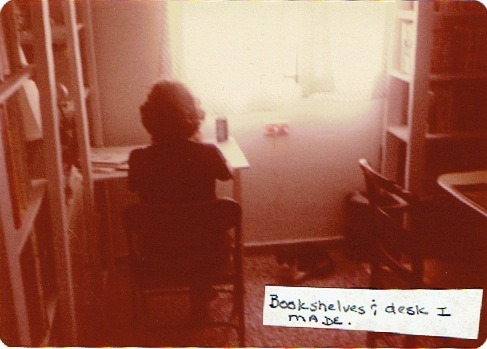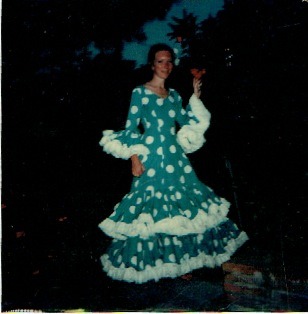When I see a man drinking bourbon,
I expect him to be the kind who could build me a bookshelf.
But not in the way that one builds a ready-made bookshelf.
He will already know where the lumberyard is.
He’ll get the right amount of wood without having to do math.
He’ll let me use the saw,
and not find it cute that I don’t know how to use the saw.
For Crouch, this represents “a rather old-fashioned statement about gender.” Crouch goes on:
Despite the modern, fashionable feel of its new ads, Woodford Reserve’s definitions of gender are radically narrow, and its sense of the possibilities for human sexuality even narrower. Men must appeal to women, and women to men. To attract women, men have to be rugged and capable while maintaining a perfect veneer of nonchalance. Women can spot a phony or a wimp a mile away. Women, meanwhile, have to be forever good sports, proud of their men’s rough edges and presentable in mixed company with the rowdy boys. The core message is one of stern-faced seriousness: Bourbon defines a man’s world, and women are welcome only if they play by the men’s rules.
For the record, the Woodford spot didn’t really bother me. Even Crouch concedes that “[i]n the pantheon of sexist advertising, Woodford barely merits inclusion.” But the conversation reminded me of
this piece I wrote last year about the gendering of drinking, and after reading it I decided to check on Whiskey Catholic, the blog I mentioned in that post.
I want to like Whiskey Catholic. They offer great reviews, they seem supremely knowledgeable, and they write with the jolliness you find in many of the best Catholic writers.
Funny coincidence: the day I checked in, Whiskey Catholic’s most recent post was “
Man Skills: Making a Table.” The first line reads: “There’s nothing more romantic than making something for a woman using your own two hands, especially if that something ends up looking better than what you could buy at a department store.”
(I’ve got something to say about the manliness of table-making, but I’ll save that for a follow-up post.)
Anyway, as I flipped through Whiskey Catholic’s posts, I started to think that Robert Christian might be right to say that
the Catholic Church has a drinking problem. Don’t get me wrong—I don’t agree that the problem is the one Christian diagnoses. “While engaging in interfaith dialogue,” Christian complains, “the vast majority of thoughtful, virtuous young people I have met from other faiths have been teetotalers (those who abstain from alcohol entirely), while I have witnessed many of my fellow devout Catholics, who are otherwise morally serious, acting foolishly due to their consumption of alcohol.”
I flatly disagree with Christian that the Church should encourage teetotaling. Obviously.
No, for me, the real problem comes when the Church’s insistence on strict complementarianism gets all mashed-up with its love of drinking. What Crouch identifies in the Woodford ads is just a lazy failure to see beyond the gender binary. But in the hands of the writers at Whiskey Catholic, gendered drinking becomes something much worse: dogma.
In other words, for these writers, drinking, which should be liberating, is about reinforcing order. Where drinking could be seen as a way of breaking down divisions and building community, instead it becomes a means of building divisions and excluding others.
Take the “Whiskey Men” designation that Whiskey Catholic bestows on “men who lived fascinating and fruitful lives.” The honor, I guess, is meant as a sort of “Most-Interesting-Man-in-the-World” award, and Whiskey Catholic does write up some amazing stories, like
this oneabout the priest who was recently awarded the medal of honor. But the
last group of menthey gave the award to was (ahem) the U.S. Bishops, including Charlotte Bishop Peter Jugis who (
ahem) “defended the Catechism” after a talk by Sister Jane Laurel that (ahem) “included evidence drawn from scientific studies.” And also Bishop Paprocki for refusing communion to pro-choice senator Dick Durbin.
This was Bishop Paprocki’s second “Whiskey Man” award;
the first time, Whiskey Catholic cheered him for defending (
ahem) traditional marriage in a talk in which he apparently told those who disagree with him to become Protestants. Seems to me like only a lousy shepherd would tell his sheep to jump the fence for another pasture, but what do I know?
Or take their series on “
The Catholic Gentleman,” in which posts on things like how to tie a bow-tie are interspersed with calls to confront relativism and to persevere in the face of the Supreme Court “giving its tacit endorsement to sodomy and the redefinition of union.”
For them, whiskey just serves this ideology. As Crouch writes about the Woodford ads, “Whiskey is about enacting particular rites of manhood, alone with other men and the ghosts of the manlier men of the past.” That’s almost word-for-word what Taylor Marshall said in his interview with Whiskey Catholic.
Which is disappointing because a proper (
ahem) theology of the bottle would actually
challenge the accepted Catholic dogma regarding human sexuality. As
I’ve written before, that dogma is most often expressed in terms of an analogy with eating:
The idea is this: eating and sex both give us pleasure, but both have a vital purpose—nourishment, in the case of eating, and reproduction, in the case of sex. [Folks on the Catholic Right] argue that when we have deliberately non-procreative sex (sodomy, masturbation, contraceptive sex) we’re separating the pleasure of sex from its vital purpose. And this is as unnatural as separating the pleasure of eating from its nourishment—which, [they] say, would be like eating a great meal only to intentionally throw it up.
But drinking has a vital purpose, too—hydration—and drinking alcohol works against that. When we ingest liquor we harm ourselves in lots of ways, and open ourselves to all sorts of unnecessary and potentially catastrophic risks.
That makes no sense under the rubric used to condemn non-procreative sexual activities. It only makes sense if we think about Rowan Williams’ question in “The Body’s Grace”: “But if God made us for joy?”
In other words, it’s impossible to reconcile the puritan, instrumentalist sexual ethic of the Catholic Right with a hearty embrace of alcohol. The best Catholic writers know this, and that tension animates all of their writing on booze. That’s why Chesterton’s “Wine When it is Red” conflicts with the oversimplified Thomist reasoning that undergirds the current Catholic thinking on sex, and it’s why Percy’s “Bourbon, Neat”
has more in common with “The Body’s Grace” than the “Theology of the Body.”
Misguided as he is, Robert Christian is absolutely right to question where drinking fits in the current Catholic cosmovision, and he’s right to oppose “GK Chesterton’s pugnacious writings” on alcohol to the teachings of the Church. He gets what the writers at Whiskey Catholic don’t: you have to choose your drinking or your dogmatism, your bottles or your certitude, your whiskey or your self-righteousness.


